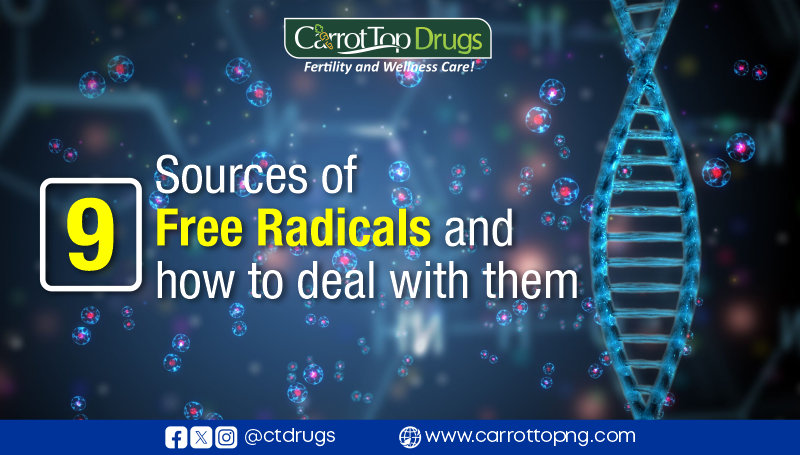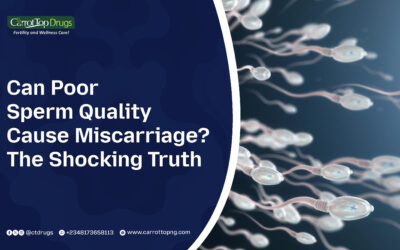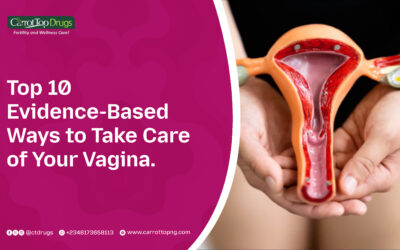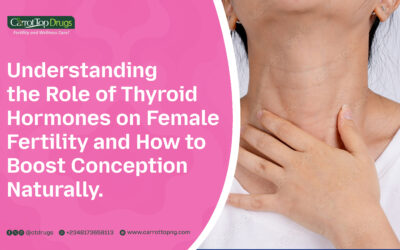Introduction:
Free radicals are important in our body’s processes, but too many can cause problems. These reactive molecules, also called ROS, can damage cells and disrupt how our body works. This can affect fertility and lead to various health issues like heart problems and cancer. Understanding where these free radicals come from in our body is crucial. In this article, we’ll look at the sources of free radicals and how they impact fertility and health and proffer possible solutions to reduce their harmful effects.
Prevalence of Infertility Caused By Free Radicals
The prevalence of infertility linked to free radicals presents a significant global concern. Research indicates that oxidative stress is prevalent among couples facing infertility issues, characterized by heightened levels of reactive oxygen species (ROS) observed within both male and female reproductive systems (Agarwal et al., 2020). In women, oxidative stress has been associated with impaired follicular development, disrupted ovulation, and compromised implantation processes (Agarwal et al., 2020). In women, the prevalence of infertility ranges from 7-28%. Similarly, in men, oxidative stress can adversely affect sperm function and viability, leading to reduced fertility (Agarwal et al., 2020). According to research conducted by O’Flaherty C. in 2020, ROS-mediated damage to spermatozoa is a significant contributing factor to infertility in 30-80% of infertile men.
Given the substantial impact of oxidative stress on fertility, addressing this imbalance has become a central focus in infertility treatment. Antioxidant therapies have emerged as promising interventions to mitigate the effects of free radicals and improve reproductive outcomes (Agarwal et al., 2020).
Sources of Free Radicals In The Body
1. Endogenous Sources:
– Cellular Respiration:
One of the primary endogenous sources of free radicals is cellular respiration, the process by which cells generate energy in the form of ATP. During cellular respiration, mitochondria produce reactive oxygen species (ROS) as natural byproducts. Although ROS play essential roles in cell signaling and immune responses, excessive production can lead to oxidative stress and damage cellular components.
– Enzymatic Reactions:
Enzymes involved in various metabolic processes can also generate free radicals as part of their normal function. For example, enzymes like xanthine oxidase and NADPH oxidase produce ROS during metabolic reactions, contributing to oxidative stress.
– Inflammation and Immune Responses:
One of the predominant sources of free radicals in the body is immune response and inflammation. Inflammation and immune responses are natural defense mechanisms of the body against infections and injuries. However, activated immune cells, such as neutrophils and macrophages, release ROS as part of their antimicrobial activities. While this helps eliminate pathogens, prolonged inflammation can lead to chronic oxidative stress and tissue damage.
2. Exogenous Sources:
– Pollution:
Environmental pollutants such as vehicle emissions, industrial emissions, and particulate matter can introduce free radicals into the body. It is one of the exogenous sources of free radicals. Pollutants like nitrogen dioxide (NO2), sulfur dioxide (SO2), and ozone (O3) can undergo chemical reactions in the body, generating ROS and contributing to oxidative stress.
– UV Radiation:
Exposure to ultraviolet (UV) radiation from the sun is another significant exogenous source of free radicals. UV radiation penetrates the skin and generates ROS, leading to oxidative damage to cellular DNA and proteins. Prolonged exposure to UV radiation increases the risk of skin cancer and accelerates skin aging.
– Tobacco Smoke:
Cigarette smoke contains a myriad of harmful chemicals, including free radicals such as reactive oxygen and nitrogen species. Inhalation of tobacco smoke exposes the body to high levels of free radicals, which can damage cellular membranes, DNA, and proteins, contributing to various health problems, including lung cancer and cardiovascular disease.
– Alcohol Consumption:
Excessive alcohol consumption can induce oxidative stress in the body by promoting the production of ROS and impairing antioxidant defenses. Alcohol metabolism generates free radicals, while ethanol-induced liver damage further exacerbates oxidative stress.
– Unhealthy Diet:
A diet high in processed foods, trans fats, and refined sugars can contribute to oxidative stress. These foods lack essential nutrients and antioxidants that help neutralize free radicals, leading to an imbalance between ROS production and antioxidant defenses.
– Exposure to Toxins and Chemicals:
Exposure to toxins and chemicals in the environment, such as heavy metals, pesticides, and industrial chemicals, can increase oxidative stress in the body. These compounds can directly generate free radicals or disrupt antioxidant systems, leading to cellular damage and dysfunction.
Effects of Free Radicals In The Body
Free radicals, when produced in excess, can have detrimental effects on the body’s delicate balance. These highly reactive molecules, also known as reactive oxygen species (ROS), have the potential to cause damage to various cellular components, including DNA, proteins, and lipids (Halliwell & Gutteridge, 2015). This damage can lead to cellular dysfunction and tissue damage, disrupting normal physiological processes.
1. Reduce Oocyte Quality
In the context of fertility, oxidative stress induced by free radicals has been identified as a significant factor contributing to both female and male infertility (Agarwal et al., 2020). In women, oxidative stress can adversely affect oocyte quality, impairing their ability to mature properly and be fertilized. Additionally, oxidative stress can disrupt hormonal balance, leading to irregularities in the menstrual cycle and ovulation. Conditions such as endometriosis and polycystic ovary syndrome (PCOS), which are associated with infertility, have also been linked to increased levels of oxidative stress (Agarwal et al., 2020).
2. Impairment of Sperm Function
Similarly, in men, free radicals can exert harmful effects on sperm health and function. Oxidative stress can damage sperm DNA, leading to genetic abnormalities that can impair fertility and increase the risk of miscarriage. Additionally, free radicals can decrease sperm motility, making it more difficult for sperm to reach and fertilize the egg. Sperm abnormalities such as reduced sperm count and abnormal morphology have also been associated with oxidative stress (Agarwal et al., 2020).
3. Adverse Health Conditions
Furthermore, oxidative stress caused by free radicals is not limited to fertility issues but also extends to the pathogenesis of various health conditions. The damaging effects of free radicals on cells and tissues can contribute to the development of cardiovascular diseases, including atherosclerosis and hypertension, by promoting inflammation and endothelial dysfunction (Sena et al., 2013). Neurodegenerative disorders such as Alzheimer’s disease and Parkinson’s disease are also linked to oxidative stress, which can lead to neuronal damage and cognitive decline (Halliwell, 2006).
4. Development of Metabolic Disorders and Cancer
Moreover, oxidative stress plays a role in the development of metabolic disorders such as diabetes, as it impairs insulin signaling and promotes insulin resistance (Rains & Jain, 2011). Additionally, oxidative stress has been implicated in the initiation and progression of cancer, as it can cause DNA damage and mutations that promote tumor formation (Klaunig et al., 2011).
Possible Solutions to Excessive Free Radicals in the Body
Mitigating the impact of excess free radicals in the body requires a multifaceted approach. Adopting a healthy lifestyle that includes regular exercise, a balanced diet rich in antioxidants, adequate hydration, stress management, and avoidance of environmental toxins can help reduce oxidative stress.
Regular Exercise
Regular exercise has been shown to increase antioxidant defenses in the body and reduce oxidative stress levels (Radak et al., 2013). It promotes the production of endogenous antioxidants and enhances cellular repair mechanisms, thus protecting against free radical-induced damage.
Balanced Diet
A balanced diet that includes a variety of fruits, vegetables, whole grains, nuts, and seeds provides essential nutrients and antioxidants that help neutralize free radicals (Ferguson et al., 2014l). Antioxidants such as vitamins C and E, beta-carotene, and selenium scavenge free radicals and prevent oxidative damage to cellular components (Bjelakovic et al., 2013). Foods rich in these antioxidants include citrus fruits, berries, leafy greens, nuts, and seeds.
Adequate Hydration
Adequate hydration is essential for maintaining cellular hydration and facilitating the removal of metabolic waste products, including free radicals (Popkin et al., 2010). Drinking an adequate amount of water throughout the day helps flush out toxins and supports the body’s natural detoxification processes.
Stress Management
Stress management techniques such as mindfulness meditation, yoga, deep breathing exercises, and progressive muscle relaxation can help reduce stress levels and lower oxidative stress (Pascoe et al., 2017). Chronic stress activates the body’s stress response system, leading to the production of cortisol and other stress hormones, which can increase oxidative stress and damage cellular structures (Epel et al., 2004).
Avoid Environmental Toxins
Avoiding environmental toxins such as air pollution, cigarette smoke, pesticides, and industrial chemicals is crucial for reducing exposure to free radicals (Valavanidis et al., 2008). Air pollution contains a variety of harmful pollutants, including particulate matter, ozone, nitrogen dioxide, and sulfur dioxide, which can generate free radicals in the body upon inhalation (Li et al., 2017). Cigarette smoke is a potent source of free radicals, containing thousands of chemicals that can damage cellular DNA and promote oxidative stress (Pryor, 1997).
Supplements
Supplementation with antioxidants such as vitamins C and E, coenzyme Q10, and selenium may provide additional protective effects against free radical-induced damage (Carr et al., 2018; Salinthone et al., 2008). However, it is essential to consult healthcare professionals before initiating any supplementation regimen, especially for individuals undergoing fertility treatment (Agarwal et al., 2020). Our Evergreen Formular for Women and Evergreen Formular for Men contain the necessary antioxidants that helps to protect the reproductive cells from ROS.
Conclusion
Understanding the sources of free radicals in the body is crucial for maintaining optimal health and fertility. While these highly reactive molecules play essential roles in physiological processes, an imbalance in their production can lead to oxidative stress, contributing to infertility and various health conditions. By addressing modifiable risk factors and adopting lifestyle modifications that reduce oxidative stress, individuals can take proactive steps to protect their fertility and overall well-being.
FAQs
Q. Can oxidative stress affect both male and female fertility?
A. Yes, oxidative stress can impair fertility in both men and women by damaging reproductive cells and disrupting hormonal balance.
Q. Are there specific foods that can help reduce oxidative stress in the body?
A. Yes, foods rich in antioxidants, such as fruits, vegetables, nuts, seeds, and whole grains, can help combat oxidative stress by neutralizing free radicals.
Q. Is regular exercise beneficial for reducing oxidative stress?
A. Yes, moderate exercise has been shown to increase antioxidant defenses in the body and reduce oxidative stress. However, excessive exercise may have the opposite effect.
Q. Can environmental factors such as pollution contribute to oxidative stress?
A. Yes, exposure to environmental pollutants, including air pollution, UV radiation, and cigarette smoke, can increase oxidative stress in the body.
Q. Are antioxidant supplements safe for fertility?
A. While antioxidant supplements may offer benefits for fertility, it is essential to consult a healthcare provider before taking them, especially if undergoing fertility treatment.
Q. Can stress worsen oxidative stress in the body?
A. Yes, chronic stress can increase oxidative stress levels in the body by triggering the release of stress hormones and promoting inflammation.
Q. Are there alternative therapies or lifestyle changes that can help reduce oxidative stress in individuals with infertility?
Yes, practices such as acupuncture, meditation, and yoga have been shown to reduce stress levels and may help alleviate oxidative stress in individuals experiencing infertility. However, more research is needed to confirm their efficacy in improving fertility outcomes.

















